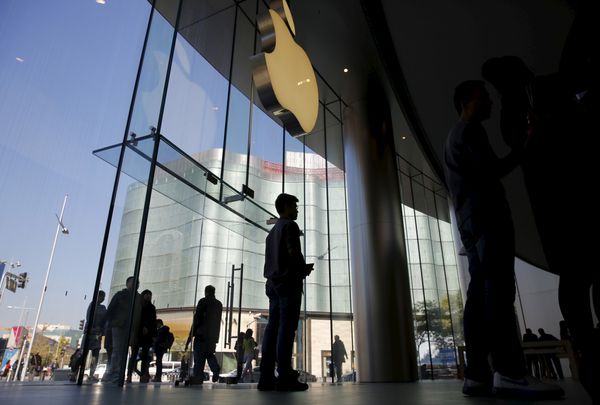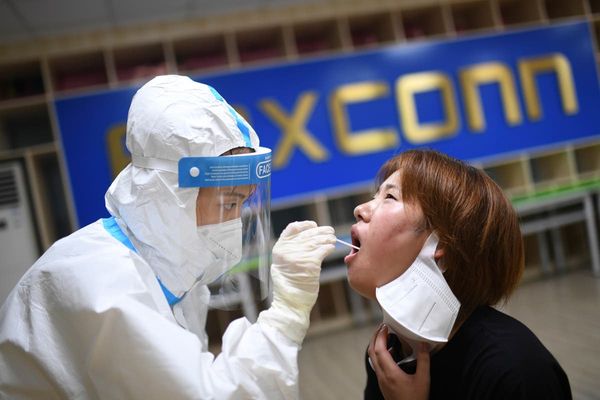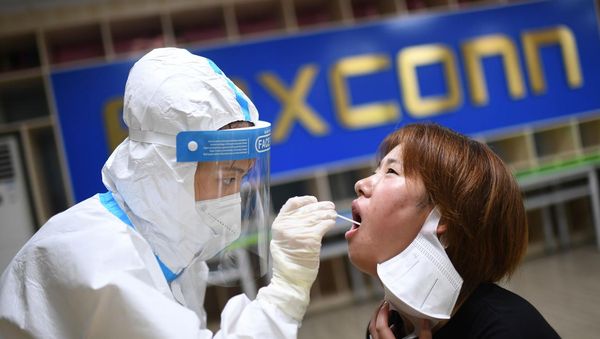
On a typical morning, thousands of workers in a Communist country idle outside the gates of Apple's production lines, waiting to enter. They grouse about the delay as mopeds and buses clog the entryways and kick dust up into the polluted air. Some post dance videos on TikTok. Others wonder aloud when they're going to meet a husband. Still others snitch on their coworkers flouting COVID-19 rules. This is life at a Chinese factory, only it's in Vietnam.
The plant in Bac Giang near Hanoi belongs to Luxshare Precision Industry Co., an electronics manufacturer based in Dongguan, China, that has supplied Apple for more than a decade. It got its start producing small components like connector ports and modules for speakers and chargers, and later graduated to devices like AirPods and Apple Watches. It’s currently the largest producer of the wireless Apple earbuds in the world, with analysts estimating it will ship around 50 million pairs of headphones this year, more than half of the global total.
Luxshare began serving Apple out of its factories in mainland China. It has manufacturing hubs in dozens of Chinese cities, many of them in Jiangsu province along the country’s east coast and in Guangdong in the Pearl River Delta. And as Apple has diversified its supply chain away from China, Luxshare has moved with it rather than risk losing its No. 1 customer. In 2016, the company established a presence in Vietnam and began building the Bac Giang plant. The manufacturer has also formed subsidiaries in India and is reportedly seeking approval to acquire a former Motorola manufacturing facility in Chennai.
Other Chinese manufacturers are doing the same, establishing plants in other countries to meet Apple’s ongoing need for manufacturing outside of China. The willingness of Chinese suppliers to follow the tech giant beyond the mainland’s borders provides Apple immediate respite from some of the headaches of doing business in China—COVID lockdowns and supply chain snarls—and lets Apple give the appearance of turning away from China amid fraught relations between Washington and Beijing.
But the shift to India and Vietnam brings headaches too, including rickety infrastructure and unfamiliar working cultures. And in the long run, Apple’s continued reliance on Chinese suppliers—even if their manufacturing takes place outside of China—leaves the Cupertino giant vulnerable to U.S. policies aimed at knee-capping China’s technological advancement.
“Multinationals want to have their cake and eat it, but satisfying both the U.S. and China in the era of the Great Decoupling will be hard to achieve,” says Diana Choyleva, chief economist at Enodo Economics. “This is especially the case for technology firms as the winner of the technology race will be the future hegemon.”
Apple's reliance on China
Apple, like many American companies, was drawn to China decades ago by its vast pool of cheap labor. When co-founder Steve Jobs introduced the first generation of iPods, iPhones and iPads in the 2000s, Chinese factories built them. His then-chief operating officer Tim Cook was a frequent visitor to the country. Today, more than 90% of the U.S. company’s production takes place in China, according to Counterpoint Research.

Many of Apple’s biggest suppliers in mainland China are run by Taiwan-headquartered companies like Foxconn, Pegatron Corporation, and Wistron Corporation, which invested heavily in China during Deng Xiaoping’s “reform and opening up” era in the late 1970s and ‘80s. Suppliers have clustered their manufacturing facilities together for efficiency, creating vast hubs in Chinese cities like Zhengzhou and Shenzhen. In the past decade, mainland Chinese-headquartered competitors like Luxshare, audio specialist GoerTek Inc., and BYD Co, an EV maker that also assembles iPads, have joined their ranks.
Apple hasn't just benefited from this Chinese supply network: To a certain extent, it has built that network. The company cooperates closely with its favored companies, from sharing ideas to reduce costs or improve processes to helping fund the research and development of future products, says Gene Tyndall, a supply chain expert at Atlanta-based eMATE Consulting who previously worked with Apple to establish its global production operations. In the past, Apple has used its vast balance sheet to make joint investments with some of its contractors, provided supply chain financing, and shared technical knowledge on everything from cost management to logistics. By introducing more competition to its supply chain, Apple increases its bargaining power and drives down costs.
Apple, Luxshare, GoerTek, BYD, Foxconn, Wistron, and Pegatron did not respond to requests for comment.
Becoming an Apple supplier
Luxshare is one of the biggest beneficiaries of Apple’s effort to develop local manufacturers in China. Chairwoman Grace Wang worked on the production lines of a Foxconn affiliate from 1988 to 1997 before launching Luxshare with her brother in 2004. The company has worked with Apple for much of its history; it even hosted chief executive Tim Cook on a tour of its facilities in Kunshan in 2017. Over the years, Wang’s fortune has grown to $11 billion, making her the world’s third-richest self-made female entrepreneur, according to Hurun Report.
Luxshare has earned more and more business from Apple partly because it has tightly controlled its expenses and funneled the savings into research and development. Taiwan’s Inventec initially produced AirPods but was unable to manufacture the devices at a profit, according to brokerage CLSA. Luxshare started making AirPods in 2017, succeeding where others failed with better quality control and by keeping costs down. (Inventec did not respond to a request for comment.)
In 2020, Luxshare gained a spot in Apple’s iPhone production chain after acquiring two assembly plants in mainland China from Taiwan’s Wistron, which at the time was reducing its presence in China and reinvesting in India.

When Luxshare went public on the Shenzhen stock exchange in 2010, its annual operating revenue was 1 billion yuan ($141.3 million). Sales have exploded since then; it generated 154 billion yuan ($21.7 billion) last year. Luxshare is attempting to diversify its portfolio of products, expanding into the manufacture of e-cigarettes and electric vehicles, but of its total 2021 sales, almost three-quarters or 114.1 billion yuan ($16 billion) came from an entity the company refers to only as "Customer 1." Analysts covering the company say Customer 1 is Apple, though Luxshare has not said so publicly.
Luxshare’s dependence on Apple means the tech giant’s shift away from China threatens the manufacturer’s future growth if it doesn’t follow suit. Losing big orders from the Cupertino tech giant can hit hard: Last month, GoerTek shares tumbled by 10% (the daily maximum) after the company disclosed that a “major overseas client,” believed to be Apple, had suspended some orders.
Reasons for Apple to diversify
For years, Apple has faced pressure to move its manufacturing away from China. President Barack Obama once grilled Steve Jobs on what it would take to bring iPhone manufacturing back to the U.S. (“Those jobs aren't coming back,” Jobs reportedly said in response.) But the events of the last several years have made the company’s effort to reduce reliance on one country all the more urgent.
The deteriorating relationship between the U.S. and China has caused near-constant headaches for Apple. The Trump administration’s trade war with Beijing led to tariffs that hiked the cost of the company’s home speakers and desktops. (Apple is now reportedly lobbying to repeal those tariffs.) Researchers have accused Apple of bowing to Chinese demands to censor applications in the App Store and on engravings on its devices. Apple set up data centers in China to store user information to comply with local regulation, a move that has sparked criticism from anti-surveillance campaigners and dented the company's pro-privacy image. Last year, four members of Congress urged the company to reassess its business practices in the country.
Since 2020, Apple has battled COVID-19 outbreaks in China. Lockdowns in Shanghai and Kunshan earlier this year forced some suppliers to suspend shipments. Last month, authorities locked down the city of Zhengzhou, gumming up a major Foxconn iPhone manufacturing hub where the number of workers can swell to more than 1 million in the run-up to the holiday season. Shortly afterwards, Apple warned that shipments of its new iPhone 14 Pro and iPhone 14 Pro Max models would be delayed as it tries to return Zhengzhou production levels to normal, with one estimate putting the shortfall at 6 million phones.

To be sure, the pandemic has halted work at Apple manufacturing facilities outside China too, including at Luxshare’s plant in Vietnam. But because Apple’s supply chain is so concentrated in China, it’s felt Beijing’s strict zero-COVID policy more so than restrictions elsewhere. The company has warned of supply constraints for some of its products and withdrew its revenue guidance for the fourth quarter.
Cook has reassured Chinese suppliers in the past that Apple won’t shift production “for the sake of lowering costs.” But the competitive advantage China once wielded is slipping. A report by the Reshoring Institute this year estimates that the average salaries of production workers and machine operators in China are roughly double what's paid to workers in Vietnam, who in turn earn twice as much as their Indian counterparts.
'Apple needs to balance everything'
There are certainly upsides to diverting manufacturing away from China, but it poses new challenges for Apple. First, it must control costs and maintain the quality of its products. Second, it must not anger Beijing too much by abandoning a Chinese manufacturing sector that employs millions of its citizens.
Steering more work to Chinese suppliers in its new geographies is one way for Apple to guard against both risks: companies headquartered in China are still producing Apple products—and reaping the resulting revenue—even if the production isn’t happening on Chinese soil.
“We think Apple still needs to balance everything," including the political ramifications of its business decisions, said Eddie Han, a senior analyst at Isaiah Research in Taipei. “Raising the share of Chinese suppliers is one of its strategies.”
Like Luxshare, other Chinese manufacturers have followed Apple to its new production hubs. GoerTek, environmentally-friendly packaging producer MYS Group Company, and Lens Technology Company have set up shop in Vietnam, according to Apple’s supplier list. Component maker Lingyi iTech and Shenzhen YUTO Packaging Technology Company also have facilities in Vietnam and India.
When Apple began publishing its suppliers’ locations in 2013, none had facilities in India, and only a handful had operations in Vietnam. On its most recent supplier list, 21 Apple suppliers had operations in Vietnam and nine had locations in India.
View this interactive chart on Fortune.com
Apple doesn't disclose what share of its production is handled by each supplier, but Counterpoint estimates the share of Apple’s global manufacturing that takes place in Vietnam will rise from 0.5% to as high as 1.5% this year; India’s stake will increase from 3% to 7%. China will still account for the vast majority of manufacturing.
The migration of Apple suppliers from China to Vietnam and India means the iPhone maker’s roster of manufacturers will look largely the same as it did before, even as it diversifies geographically. “The supply chain for Apple isn’t changing,” said Ivan Lam, senior research analyst at Counterpoint Research.
The risks of Apple's move away from China
But there are still risks. India and Vietnam offer cheaper labor, but their cost advantages stop there. The countries’ poor infrastructure, weaker investor protections and court systems, and corruption add to the cost of doing business, according to a joint report by KPMG and the Manufacturing Institute. Indian and Vietnamese workers face a language barrier with their Mandarin-speaking bosses and they often prefer to live near the factories where they work, unlike Chinese workers, who travel great distances for jobs at city-sized manufacturing hubs like in Zhengzhou.
And U.S. pressure on Chinese tech companies may squeeze Apple’s Chinese suppliers regardless of where they are. In October, Nikkei Asia reported that Apple had dropped plans to add China's Yangtze Memory Technologies Co. as a supplier after the Commerce Department announced export controls barring U.S. chip companies from supplying services or know-how to Chinese chip manufacturers, no matter where chip production takes place.
Outside the gates of Luxshare's plant in Bac Giang, a provincial capital about 30 miles north of Hanoi, the creation of industrial zones to support factories pumping out products for companies like Apple and Samsung Electronics has triggered an explosion of economic growth, transforming the lives of Vietnamese workers. "People from all over come and work at factories in Bac Giang," said one engineer at the plant. "Traditional occupations are gradually fading into oblivion."
Many workers at Luxshare note that everyone seems to be carrying a smartphone now. Salaries average around $400 a month, enough for an entire family to live on.
Some Bac Giang Luxshare workers are envious of the lighter schedules at Korean and Japanese plants, where logging 26 days each month is the norm, rather than the 28 required by Luxshare. Chinese companies like Luxshare have imported another trait of their operations back home—the “996” culture of working 9 a.m. to 9 p.m., six days a week. The only difference is workers in Vietnam start an hour earlier and call the regime 886.










